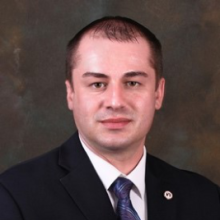Members of the House and Senate cast their final votes this week to approve legislation taking decision-making authority on the siting of commercial wind and solar energy projects away from local governments and into the hands of state bureaucrats.
House Bills 5120 and 5121 are expected to be approved by Gov. Gretchen Whitmer, a vocal proponent for removing locals’ authority and giving it to the Michigan Public Service Commission (MPSC), consisting of three members appointed by the governor.
With the two-bill package passing on party-line votes in both chambers (see how your legislator voted), Democrats plowed forward amid strong opposition from the Michigan Farm Bureau, Michigan Townships Association, Michigan Agri-Business Association, Michigan Association of Counties, and Michigan Association of Planning, among other groups and numerous individuals.
“The only thing this legislation effectively delivered is a multitude of disappointments,” said MFB Legislative Counsel Andrew Vermeesch. “It failed miserably in striking a balance between renewable energy, land use, private property rights and farmland preservation.”
More than 2,100 individuals responded to MFB’s action request on the issue, sending more than 4,200 messages to lawmakers opposing the legislation and expressing their support for keeping solar and wind energy siting decisions in the hands of locally elected officials.
Vermeesch said the amendments made to the bills between introduction and final passage only serve to further tie the hands of local governments.
“The amendments adopted create an illusion of local control; it’s a façade,” he said, saying the changes mandate that local governments follow strict state requirements when creating ordinances related to wind, solar and energy storage facilities.
“They are unrealistic standards and only offer a short-lived opportunity for input with little to no flexibility to factor in community characteristics.”
He went on to explain that local governments will only be able to reject a project if the application is incomplete or does not fit the criteria outlined in the bills. Further, if the local government rejects or does not act on the application within the allotted time, the developer could appeal to the MPSC for permitting, thus preempting the local ordinance.
“This is far from local control,” Vermeesch said.
“When it comes to renewable energy projects, we have members on both sides of the issue and it is important that we acknowledge that,” Vermeesch continued. “Some landowners and farmers see commercial energy projects as a positive opportunity that allows them to diversify their income as well as capitalize on the investments they have made into farmland over the years.
“However, not all farmers feel the same way and have concerns about the long-term impacts on production agriculture — both viewpoints are valid.”
He clarified that the legislation finalized this week is not about supporting or opposing renewable projects, but rather the permitting process.
Michigan Farm Bureau’s member-developed and approved policy has long supported the township government system and the idea that local elected officials are best positioned to evaluate renewable energy project locations and consider community variables in ways that state level authorities cannot.
“Similar to the diversity of Michigan agriculture, each Michigan community is equally diverse, and this one-size-fits-all approach will have consequences for years to come,” Vermeesch added.
Renewable Energy Standards
In addition to the energy siting legislation, the House and Senate passed three bills — also opposed by Michigan Farm Bureau — to change requirements, standards and goals for renewable energy and waste reduction.
Senate Bills 271, 273 and 502 are also anticipated to be quickly approved by Gov. Whitmer.
“We are concerned this legislation will present challenges to energy reliability and affordability in this state, which hinders our ability to remain competitive,” Vermeesch explained, emphasizing that agriculture is particularly vulnerable to energy interruptions and price volatility.
“This legislation will disproportionately affect small businesses, like farms, who rely on affordable and reliable energy in order to operate.”
Significant changes outlined within the legislation include:
Requiring electric providers regulated by the MPSC to achieve a renewable energy credit portfolio of at least 15% through 2027, 50% in 2030 through 2034, and 60% in 2035 and beyond.
Requiring an electric provider to achieve a clean energy portfolio of 80% in 2035 and 100% by 2040 and beyond.
Categorizing digesters and biomass systems as renewable energy resources. Only biomass systems operational by the effective date are eligible; there are no restrictions on digesters.
Modifying the distributed generation program by raising the current cap of 1% and increases it to 10%. A distributed generation program allows customers to install residential renewable energy to offset their bill.
Requiring electric providers to have an energy waste reduction plan that has been approved under the requirements of the Michigan Clean and Renewable Energy and Energy Waste Reduction Act.
Requiring the MPSC to identify environmental justice communities as well as encourage grant making to the communities with the highest energy burden.
Requiring the MPSC to determine whether an integrated resources plan would make adequate progress towards the elimination of adverse effects on human health due to generation or if the plan would adequately reduce harm to the health, safety, and welfare of environmental justice communities.
Requiring prevailing wages and project labor agreements for the construction and maintenance of clean energy projects.
Share Story
Article Tags


